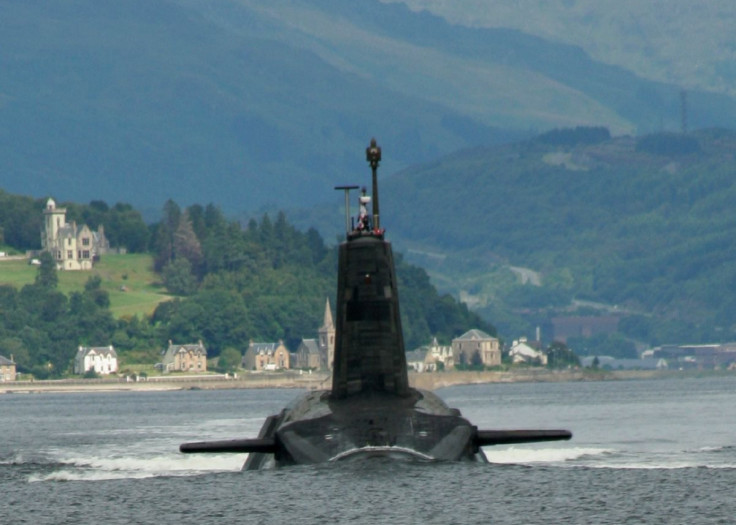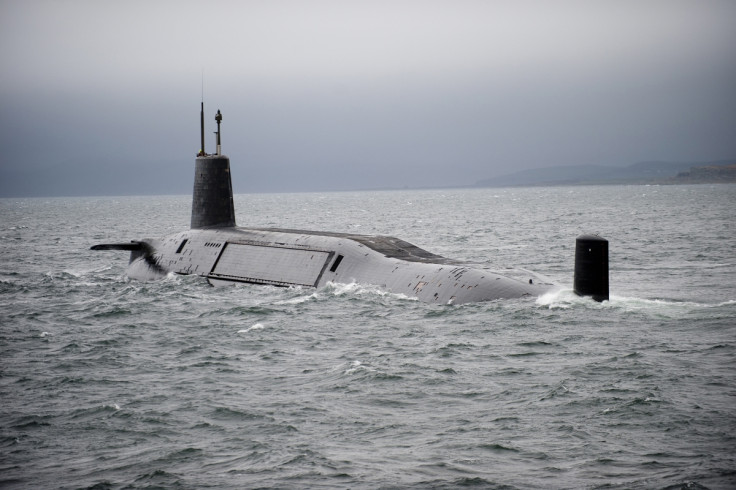Stop Trident London rally: Nuclear weapons submarines detectable by super-fast 'underwater drones'

As political party leaders prepare for the Stop Trident national demonstration in London on Saturday 27 February, Kate Hudson, general secretary of Campaign for Nuclear Disarmament (CND) spoke to IBTimes UK. Hudson outlined her objections to the UK's nuclear weapon system.
"Trident is a weapon of mass destruction with phenomenal killing capacity. Everyone is aware of the damage nuclear weapons do, not only in terms of the immediate blast but of course the radiation impact which affects subsequent generations."
CND's general secretary believes the UK is at a breakpoint where the country could opt to move away from nuclear weapons possession, believing it is in effect a 20<sup>th-century form of weaponry.

"Technology has developed so that some experts believe that Trident could be rendered redundant by a cyberattack on its computer systems. When Trident was built, submarines were supposed to be undetectable underwater. Now with the development of very fast underwater drones - NATO, Russia, China are all developing them. The idea that submarines will still be undetectable in 20 years' time is just silly," Hudson says.
"The world is now too dangerous to have nuclear weapons. The possibility of nuclear material getting into the hands of terrorists means we are storing up a big problem for ourselves by maintaining these kinds of weapons.
"We want to raise awareness through the demonstrations about the decision which is taking place in Parliament this year, to send a strong message to government that people are very concerned about this. Trident is not the best way forward for our country's security, not the best use of tax payers' money. We would all rather spend it on something more useful whether it's conventional weapons, or hospitals, housing, education.
"Our status in the world shouldn't be based on killing capacity, it should be on being educated and eradicating poverty. That's how we want Britain to be seen globally. A forward-looking, humane nation."
Jeremy Corbyn will address the anti-nuclear weapons rally, which is expected to draw crowds of tens of thousands. Scottish First Minister Nicola Sturgeon and Plaid Cymru's Leanne Wood will also be attending, as well as Green MP Caroline Lucas alongside 27 national organisations, from trade unions to faith groups, civil society organisations and political parties.
Please join #StopTrident @CNDuk demo on Saturday. https://t.co/sSQ4mXW42G love from the YF & @MassiveAttackUK boys. pic.twitter.com/HzZn4GQEeR
— YOUNG FATHERS (@Youngfathers) February 25, 2016
What is Trident?
The UK Trident programme was announced in July 1980, and patrols began in December 1994. Since 1998, Trident has been the only British nuclear weapon system in service. Its purpose is to provide "the minimum effective nuclear deterrent as the ultimate means to deter the most extreme threat."
The system is made up of 58 leased Trident II D-5 missiles, four native Vanguard-class ballistic missile submarines, and 160 operational thermonuclear weapon warheads, together with command-and-control and other supporting infrastructure.
Each of the submarines can carry up to 16 Trident II D-5 submarine-launched ballistic missiles (SLBMs), with each missile capable of carrying up to 12 independently-targetable nuclear warheads. This makes for a potential maximum of 192 warheads per submarine.

Replacing the missiles
The Vanguard-class submarines were built with a 25-year life expectancy, taking them into the 2020s. The Trident II D-5 missiles are expected to continue in service until at least 2042 following an upgrade.
The government announced its intention to replace the four vessels after 25 years' service, though there is the possibility to extend this to 30. Costs are uncertain, though a figure of £80bn is typically cited. Independent calculations, based on official figures, put the lifetime cost of the entire replacement programme, including maintenance costs, at £167bn, a figure disputed by the Ministry of Defence.
Much depends on whether the replacement programme buys new-design boats, modifies the design of the existing Astute class SSN to carry ballistic missiles, or simply acquires new Vanguard-class submarines.
It is also uncertain whether the replacement programme will buy three submarines or four. Four submarines would guarantee "continuous at-sea deterrence". Three submarines would present a risk that continuity could be stretched. The proposed British replacement of Trident is a programme replacing the existing Trident weapons system based on four Vanguard class submarines each armed with 16 Trident II submarine-launched ballistic missiles.
A final decision to proceed with the replacement has not yet been taken although the government believes it has enough votes to win on Trident, even in the face of Labour and Scottish National party opposition. Defence minister Michael Fallon has said: "If you are going to have a deterrent, you have to be prepared to use it."
Fallon was speaking after a tour of HMS Vigilant, one of the UK's four submarines that carry Trident missiles capped with nuclear warheads, docked at Faslane naval base on the river Clyde in Scotland. "If Labour maintains this new position against the deterrent, clearly they are a threat to national security because it means we would be less safe under a future Labour government.
"I hope even now that their review, which is being led by a Labour leader who is anti-nuclear and a shadow defence secretary who is anti-nuclear, will listen to more moderate mainstream Labour voices.
"It's extremely dangerous, it will undermine our alliances, weaken our standing in the world and would threaten our safety. It's like making imitation rifles. Nuclear patrols would be pointless without nuclear weapons."
Opposition to Trident
The Trident system received significant opposition during its development. The most visible opposition has stemmed from the more general use of nuclear weapons, and also from Trident's status under international law. Trident is also seen by some, such as the Scottish National Party, as a sticking point in relations between the Scottish Parliament and Westminster, since the submarines which carry the missiles are based at HMNB Clyde in Scotland.
A poll by Bristol University showed that nuclear weapons only made 3% of people feel safe. Following the election of Jeremy Corbyn as Labour party leader in September 2015, a Labour List poll showed 53% of the party's members want to get rid of Trident. Only 19% supported a new nuclear weapons system.
A Survation poll in January 2015 showed 47.2% of Scottish people oppose a new generation of nuclear weapons being based on the Clyde, with 31.6% in favour.
79% of respondents to a Guardian poll in April 2014 did not think the UK should replace Trident. In a February 2014 ComRes poll, 65% said they would feel uncomfortable living near a nuclear weapons base and 64% think there should be an international convention banning nuclear weapons.
© Copyright IBTimes 2025. All rights reserved.






















